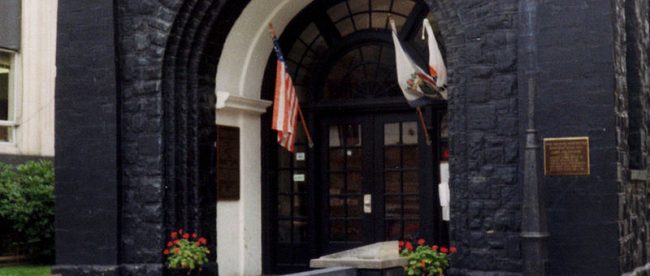How the Soviet Union Saved Vulcan

Vulcan is an M-class planet (or, was, if you think Chris Pine is more Kirk than William Shatner) in the universe of Star Trek. It’s the home planet of the eponymous Vulcan species, most notably Spock, depicted by the late Leonard Nimoy. It’s a planet where logic always trumps emotion and ears come with pointy tips.
None of that is true in West Virginia. Although there’s a little bit of Vulcan there, too. And because of some creative negotiating, they have a bridge.
Vulcan, West Virginia is an unincorporated area in the south of the state, just across the river from Kentucky. (Here’s a map.) It’s part of Mingo County, an old coal mining community dating back to the late 1800s. The fate of Vulcan, like the county as a whole, followed the local coal industry, which burgeoned at the start of the 20th century but sputtered half way through. As Appalachian Magazine reported, “by the early 1960s the mines, which served as the small town’s lifeblood, dried up – causing all operations to cease. Soon, what was once a flourishing hamlet had been reduced to little more than twenty families; all of which were remaining holdouts who refused to leave the place they now knew as home.”
By the mid-1970s, though, they couldn’t leave even if they tried — because there was really no way out. At the time, there were no roads into or out of Vulcan, save for a private railway access road which wasn’t open to the public (the railroad company enforced the anti-trespassing rules) and was dangerous regardless, as trains would whoosh by only inches from any cars on the unpaved gravel road. The only other exception was a footbridge into Kentucky, but that couldn’t handle automobile traffic and was dilapidated regardless. In 1974, that bridge collapsed; from that point on, the people of Vulcan could either risk taking the gravel access road or they had to stay put. And no hope was in sight. CBS News reported on the situation in the summer of 1977, noting that the state government declined to invest the $1.3 million needed to build a bridge. Vulcan was stuck.
A Vulcan man named John Robinette, frustrated with the isolation suffered by himself and his fellow Vulcanites, named himself mayor. As his first, and really only act, he began a campaign to get a bridge built. First, he went to the governor of West Virginia, but that resulted in failure. Then he had a brilliant idea: ask Leonid Brezhnev for help.
Brezhnev was the head of the Soviet Union at the time, and the U.S. and U.S.S.R. were deep in the Cold War. Robinette, perhaps, figured that the Soviet Union would love to be the ones to bail out an American town; the propaganda value of a $1.3 million bridge would certainly outweigh that cost. While Brezhnev himself didn’t answer Robinette’s letters, someone behind the Iron Curtain did. Per the New York Times, “Iona Andronov, a [New York-based] writer for Literaturnava Gazeta, a weekly publication in Moscow, got wind of the story and wound up in Vulcan on Mr. Robinette’s arm.”
That was enough for Vulcan to get what it wanted. On December 17, 1977 — coincidentally (or not) the day Andronov came to visit — the state announced that it would, indeed, build that bridge Robinette and his town were demanding. By the summer of 1980, per the AP, concrete had been poured and the single-lane bridge was well on its way to completion. Vulcan could, finally, explore the universe around them.
The bridge, which is still there, isn’t called Embarrassment Bridge, but it probably should be.
Bonus fact: In 2012, President Obama was re-elected to the office — but Mingo County wasn’t the reason why. Obama received only 27% of the vote (compared to challenger Mitt Romney’s 70%) in Mingo County compared to a 62/35 split state-wide. And it could have been worse. That year, a man named Keith Judd managed to get onto the West Virginia ballot as a Democrat, forcing Obama into a primary — a rather surprising fact given that Judd was in Texarkana, Texas, serving a 17-and-a-half year prison sentence. Even more surprising? While Obama beat Judd state-wide, he lost to him in Mingo County. Of the nearly 5,000 registered Democrats who voted in the primary that year, more than 60% voted for Judd.
From the Archives: Street Meat: If you go to West Virginia, maybe you’ll get to meet Little Miss Roadkill.
